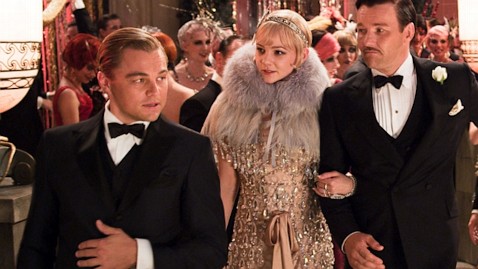'The Great Gatsby' Offers Glitzy Visuals But Nothing Else

Warner Bros. Pictures/AP
Based on the classic F. Scott Fitzgerald novel of the same name, "The Great Gatsby" casts Tobey Maguire as Nick Carraway - and already Baz Luhrmann's film is at a deficit. Maguire, impressive and perfectly cast throughout most of his fantastic career, gets lost in Luhrmann's eye-popping, era-melding, grandiose narrative. It's odd, because Maguire's mere presence - his big, expressive eyes, his slight, everyman vulnerable physicality - almost always elicits empathy before he even opens his mouth. It's not working here.
When we meet Nick, he's not well. He's in therapy trying to deal with an experience that has changed his life, though it's not clear whether he's been institutionalized or is just being treated by a doctor in a building that's now the cinematic visual cliché of a mental institution. We learn some things about Mr. Carraway: he comes from a well-to-do family, seems to have fought in World War I, attended an Ivy League school, likes to write and like so many young men during the roaring 20s, tried to strike it rich as a bond salesman.
During one particular summer, Nick rents a bungalow on Long Island, New York, not far outside New York City and next door to an opulent mansion owned by a mysterious man named Jay Gatsby (Leonardo DiCaprio). The bungalow's located on West Egg, where all the people with new money live. Nick's cousin Daisy (Carrie Mulligan) and her husband, Tom (Joel Edgerton), Nick's old college classmate, live in East Egg, where all the old money is. One day, Nick glimpses Gatsby, and off we go.
Luhrmann's 3D, computer generated rendering of Long Island and New York City is gorgeous. In fact, Lurhmann's dreamscape aesthetic is "The Great Gatsby's" only real strength - and at the same time, its glaring weakness.
For instance, when we first meet Daisy, the doors open to a grand room filled with waves of beautiful white curtains billowing in the wind, seemingly permeating every part of the room, as if opening the doors to heaven. It's an indelible, stunning image. When the balcony doors are closed, the curtains gently drift to the floor to reveal Daisy, lollygagging on the couch with her friend, golf pro Jordan Baker (Elizabeth Debicki). Both Mulligan and Debicki are striking figures but after being treated to the fantastic spectacle that precedes them, who cares?
This is how Luhrmann completely undermines his own movie, and it is confounding. He's assembled an incredible and talented cast and then turned them into set pieces. Leonardo DiCaprio as Jay Gatsby is supposed to be the star of this movie but Luhrmann is so focused on immersing us in the sights and sounds of this fusion of eras he's created, DiCaprio is practically irrelevant.
DiCaprio gives it his best as the title character but this may be the only time his best won't do. Everything meant to make him an empathetic character is channeled into a flapper twerking in a backroom speakeasy, or a spectacular party scene in a New York City apartment featuring an unhinged Tobey Maguire and a track by Jay-Z, a scene that harkens back to Luhrmann's best movie, 2001's "Moulin Rouge!" These scenes are indeed entertaining moments - they just don't serve the story. Likewise, Jack White's soundtrack cover of U2's "Love Is Blindness" and Lana Del Rey's performance of "Young and Beautiful," both complementing the visuals, are viscerally moving yet ultimately frustrating - again, because none of it serves the story. Same goes for the 3D. Though stunning during the well-choreographed party scenes in Gatsby's ostentatious mansion, the effect mostly seems like an attempt to add depth to a film that desperately needs it.
While doing press for "The Great Gatsby," both Luhrmann and DiCaprio have discussed what it was like to read "The Great Gatsby" as an adult after first reading it in junior high school. The message is that after putting some tread on the proverbial tires of life, adults are better suited to grasp the complexities and subtleties of this particular literary masterpiece. Funny, then, how Luhrmann spoon feeds "Gatsby" to the audience through spectacular visuals and hip recording artists, and in the process blunts the story's emotional impact and meaning.
It pains me to take Luhrmann to task. I love this man's creative spirit and his desire to use every piece of technology and music to immerse his audience in what he apparently intends to be the best possible cinematic experience. But technology and music should serve the story, not the other way around. Like a singer whose performance is buried beneath layers of studio processing, with "The Great Gatsby," Luhrmann has essentially auto-tuned a classic piece of literature.
Two out of five stars.